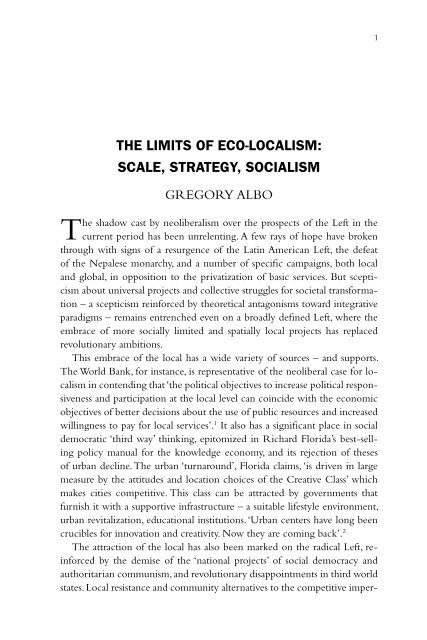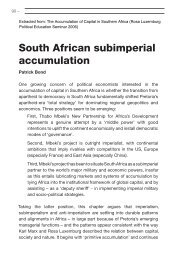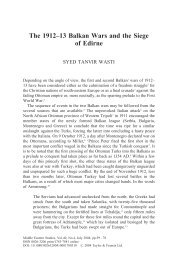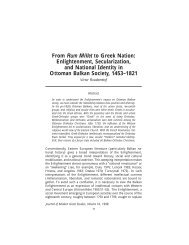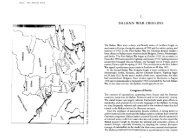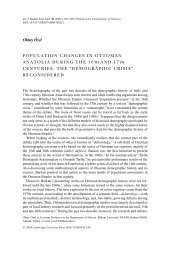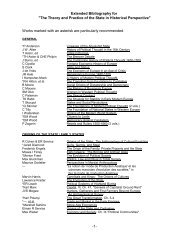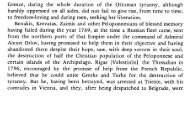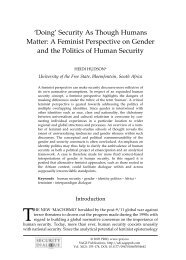THE LIMITS OF ECO-LOCALISM: SCALE, STRATEGY, SOCIALISM
THE LIMITS OF ECO-LOCALISM: SCALE, STRATEGY, SOCIALISM
THE LIMITS OF ECO-LOCALISM: SCALE, STRATEGY, SOCIALISM
- No tags were found...
Create successful ePaper yourself
Turn your PDF publications into a flip-book with our unique Google optimized e-Paper software.
1<strong>THE</strong> <strong>LIMITS</strong> <strong>OF</strong> <strong>ECO</strong>-<strong>LOCALISM</strong>:<strong>SCALE</strong>, <strong>STRATEGY</strong>, <strong>SOCIALISM</strong>GREGORY ALBOThe shadow cast by neoliberalism over the prospects of the Left in thecurrent period has been unrelenting. A few rays of hope have brokenthrough with signs of a resurgence of the Latin American Left, the defeatof the Nepalese monarchy, and a number of specific campaigns, both localand global, in opposition to the privatization of basic services. But scepticismabout universal projects and collective struggles for societal transformation– a scepticism reinforced by theoretical antagonisms toward integrativeparadigms – remains entrenched even on a broadly defined Left, where theembrace of more socially limited and spatially local projects has replacedrevolutionary ambitions.This embrace of the local has a wide variety of sources – and supports.The World Bank, for instance, is representative of the neoliberal case for localismin contending that ‘the political objectives to increase political responsivenessand participation at the local level can coincide with the economicobjectives of better decisions about the use of public resources and increasedwillingness to pay for local services’. 1 It also has a significant place in socialdemocratic ‘third way’ thinking, epitomized in Richard Florida’s best-sellingpolicy manual for the knowledge economy, and its rejection of thesesof urban decline. The urban ‘turnaround’, Florida claims, ‘is driven in largemeasure by the attitudes and location choices of the Creative Class’ whichmakes cities competitive. This class can be attracted by governments thatfurnish it with a supportive infrastructure – a suitable lifestyle environment,urban revitalization, educational institutions. ‘Urban centers have long beencrucibles for innovation and creativity. Now they are coming back’. 2The attraction of the local has also been marked on the radical Left, reinforcedby the demise of the ‘national projects’ of social democracy andauthoritarian communism, and revolutionary disappointments in third worldstates. Local resistance and community alternatives to the competitive imper-
2atives of the world market have figured prominently in the demands of theanti-globalization movement, notably in the call of the International Forumon Globalization for ‘discriminating actively in favour of the local in all policies’.3 Robin Hahnel’s important canvas of participatory economics concludeswith ‘living experiments in equitable cooperation’ that are found inlocal exchange and trading systems (LETS), locally networked cooperatives,and local participatory budgeting. 4 And Mike Davis ends his provocative assessmentof twenty-first century global urbanization sceptical of the claimsthat a new politics of ‘multitudes’ is ascendant at the global level. Instead, heargues, historical agency is now decidedly local: ‘[i]ndeed, the future of humansolidarity depends upon the militant refusal of the new urban poor toaccept their terminal marginality within global capitalism’. 5The case for political action focusing on the territorial scale of the local(and sometimes at the scale of ‘the body’) has been especially characteristicof the ecology movement. The political slogans that the ‘greens’ have contributedto the Left – ‘think globally, act locally’, ‘reduce, reuse, recycle’, ‘walkgently on the earth’ – are especially representative of the localist emphasisof their socio-ecological practice. 6 The American Green Party in 2000, withRalph Nader running for President, put forward the following position:Centralization of wealth and power contributes to social and economicinjustice, environmental destruction, and militarization.Therefore, we support a restructuring of social, political and economicinstitutions away from a system that is controlled by andmostly benefits the powerful few, to a democratic, less bureaucraticsystem. Decision-making should, as much as possible, remain at theindividual and local level, while assuring that civil rights are protectedfor all citizens. 7And in a recent manifesto emerging from the British Green Party, localizationis invoked as a panacea to virtually all societal ills:Economic localisation provides a political and economic frameworkfor people, local government and businesses to diversify theirown economies. It does not mean a return to overpowering statecontrol – merely that governments provide the policy frameworkto promote rediversification. Crucially, this will increase communitycohesion, reduce poverty and inequality, improve livelihoods,promote social provision and environmental protection and providean all-important sense of security. 8
The case for the ‘local’ as the scale appropriate for launching projects ofsocio-ecological transformation would appear, from such a broad consensus,self-evident. And the case for it would certainly seem to be reinforcedas contemporary capitalism continues to foster an urbanization process ofworld historical proportions. Half the world’s population is now urbanized,with mega-cities the size of Mexico City, New York, Tokyo, Mumbai andCairo now forming in all corners of the globe. There is every reason to expectthat the current rate of growth of urbanization (twice the rate of growthof the world’s population) will continue. Few cities anywhere are not facingecological challenges, such as waste and water management, transportationgridlock, and public health concerns over old and new viral epidemics, onan unprecedented scale.These problems pale beside the emergent urban ecological scourge of aglobal slum population now estimated at 1 billion people (the UN projects agrowth to 1.4 billion by 2020). These slums – clusters of ramshackle dwellingssprouting on toxic waste sites, mountain slopes and flood plains – arehaunted by basic ecological problems such as open sanitation, inadequate orno water supplies, and much else. Some 3 million people are estimated todie annually from urban air pollution, primarily generated from the burningof fossil fuels that are also contributing to greenhouse gases; another 1 milliondie from indoor air pollution from the gases released by the burning ofbiomass fuels. 9There is every reason to conclude that neoliberal globalization will continueto bequeath such gifts to city life. As neoliberalism has come to dominatethe global market and regulatory framework its institutionalization andlogic has fuelled developments in agriculture that drive rural people intothese slums, while at the same time fostering inter-local competition to reducewages and environmental regulation. This also means, however – especiallywhen we remember that most urban life on the planet bears noresemblance whatever to Richard Florida’s image of yuppified city centresfor the ‘creative class’, that the burden that ‘the local’ carries in strategies for apro-sustainability, anti-neoliberal (and even an anti-capitalist) agenda is enormous.If ‘place’ and ‘local space’ are where the ‘tangible solidarities’ necessaryto build an alternate way of life, and an anti-neoliberal politics, must form,then we cannot avoid confronting the systematic obstacles that have to beovercome in realizing such a project. Claims that sustainable local ecologiescan serve as the foundation for political action and social alternatives at leastrequire careful scrutiny.3
4<strong>THE</strong> VARIETIES <strong>OF</strong> <strong>ECO</strong>-<strong>LOCALISM</strong>The ecology movement has always entertained a broad range of visions thatoffer more eco-friendly economies than industrial capitalism: from greencapitalism and the eco-modernization of reforming markets, to deep ecologyand eco-feminist images of small-scale and spiritual reconstructions, tothe projects of anarchist social ecology and eco-socialism dependent uponnew systems of property. If there is one element in such diverse ecologicalthought that emerges foremost, it is the primacy of localism as the centralstrategic focus.The early texts of the modern environmental movement, from RachelCarson’s Silent Spring (1962) to Garret Hardin’s ‘Tragedy of the Commons’(1968), the Club of Rome’s The Limits to Growth (1972) and The Ecologist’s ‘ABlueprint for Survival’ (1972), are filled with references to limits, small-scaleproduction and self-sufficiency. 10 Although none of these founding contributionslaid out an explicit strategy for localism, it was the logical corollary oftheir central concerns about the earth’s ‘carrying capacity’ in face of the forcesof industrialism driving resource usage and population endlessly upwards.Few early theorists were as important, however, as E.F. Schumacher’s Smallis Beautiful (1973) in making localism both a virtue and a socio-ecologicalstrategy. From the 1950s on, Schumacher began to question, along democratic,egalitarian and ecological lines, the kind of development that was takingplace, and the technologies being applied, according to the singular ‘logicof industrialism’ that pervaded both capitalist and Soviet economies. Thesewere inappropriate, he argued, for growth, ecology and community. Whereasa critic of this singular logic like J.K. Galbraith proposed constructing countervailinginstitutions to the industrial society’s ‘technostructure’, but at thesame highly centralized level, Schumacher argued for smaller, people-centred,ecologically sustainable ways of living, with growth and size displacedfrom the centre of socio-economic life. As he famously put it:From the point of view of Buddhist economics, therefore, productionfrom local resources for local needs is the most rational wayof economic life, while dependence on imports from afar and theconsequent need to produce for export to unknown and distantpeoples is highly uneconomic and justifiable only in exceptionalcases and on a small scale. Just as the modern economist would admitthat a high rate of consumption of transport services betweena man’s home and his place of work signifies a misfortune and nota high standard of life, so the Buddhist would hold that to satisfy
5human wants from faraway sources rather than from sources nearbysignifies failure rather than success. 11While Schumacher’s promotion of ‘Buddhist economics’ did not travelwell, the conceptions he advanced of appropriate technology and localistdevelopment were widely taken up, and soon multiplied into a whole host ofalternative projects and ideas for community, cooperative and neo-artisanaldevelopment that have since become integral to green political economy(and, indeed, green lifestyles). Two signal interventions by Barry Commonerand Herman Daly reinforced this development, and shifted the question fromscale in general to an issue of sustainability from a material point of view. 12Commoner rejected the barbarism of the ‘lifeboat ethic’ involved in acceptingthe limits of the earth’s carrying capacity in relation to population. Hisconcern was with the type of science and technology that was supportingeconomic growth based on toxics and synthetics rather than natural products,and he issued a political challenge to the elites who controlled thesetechnologies and disproportionately benefited from this growth, and whostood in the way of a change in techniques to eliminate pollution. For Daly,the answer lay in a ‘steady-state economy’ with low or no growth, so as todirectly reduce ‘material throughputs’, particularly of matter and energy; thiswould address at its source the disorder produced by high-entropic emissions.These varied warnings on the limits to growth generated a series of reformistattempts to show that capitalist growth and sustainable ecology couldbe made compatible, given an appropriate policy and market context. TheBrundtland Report (1987) was an important – if ambiguous – marker ingreen thinking, and represented – and to a degree still represents – a synthesisof ecological reforms consistent with capitalist development. It definedsustainable development as ‘meet[ing] the needs of the present withoutcompromising the ability of future generations to meet their own needs’. Inthus raising the issues of both needs and limits in its search for the kind ofeconomic growth that would also sustain resources and communities, theReport made a range of development proposals in which greater decentralization,self-help and self-reliance figured centrally, pleading for greater focuson small-scale development projects within sustainable ecologies, and callingfor ‘city governments [to] become key agents of development’. 13But the consolidation of neoliberalism in political and policy frameworksat virtually all scales of governance by the early 1990s meant the BrundtlandReport found no easy passage from discursive agenda to actionable policy.Any minimal ‘green consensus’ it could have said to have captured disap-
6peared, although some of the sustainability programme became absorbedinto the neoliberal market consensus forming in the international economicinstitutions through the 1990s (as was visible in the Kyoto Accord). 14The current spectrum of ecological thinking is heavily influenced by theemergence of ‘green commerce’ and the embrace of market solutions acrosswide swaths of the ecology movement, in both thought and action. Severalpositions especially merit attention for their localist programmes – and levelof support. The most pervasive neoliberal strand of social thinking today iswhat can be termed market ecology. From Friedrich Hayek through MiltonFriedman, neoliberalism had little concern with ecology, at any scale of activity,except to argue that markets are better allocators of resources thanstates, and that prices will effectively signal natural scarcities, drawing in newsupplies and conserving existing ones, to restore a natural and social equilibrium.15 But ‘market ecology’ has emerged as a powerful strain of thinking,whose influence has spread from ecological sceptics to virtually all the leadingenvironmental NGOs, from Friends of the Earth, to Greenpeace to theSierra Club, including market ecology measures in their policy campaigns.Faith in capitalist markets, it would seem, has become all pervasive.Markets are foundationally decentralized and place-based regulators ofhuman activity in that the behaviour of sellers and buyers is regulated byprices they individually accept. To some degree, markets are the ideal ‘thinkglobally, act locally’ solution in that prices are transmitted across space toequilibrate all markets, information flowing from local markets to aggregatemarkets and back again. In the words of Earthscan’s 1989 agenda-settingBlueprint for a Green Economy, such pricing would allow for ‘the potentialcomplementarity of growth and environment’. In policy terms, this is theneed to ‘create markets in previously free services’, such as air or water, oraccess to parks and beaches, and to ‘modify markets by centrally deciding thevalue of environmental services and ensuring those values are incorporatedinto the prices of goods and services’. 16 With all commodities marketizedand all costs of production including externalities factored in, market priceswould compel individuals and firms to adjust ecologically irresponsible behaviourand regulate scarcity. By decentralizing environmental regulation tothe markets where prices are set, it becomes feasible (as neoliberalism hassought to do) to abolish extensive enforcement authorities such as state regulatorsand planning agencies.Market ecology has also typically advocated discrimination in favour ofsmaller, locally-based capitals (and in this sense offers an alternative to theneoliberalism of big corporations and governments). David Korten, for example,argues that in the case of local business ‘the social and environmental
costs associated with an investment are more likely to be visible to and tosome extent shared by investors and their neighbours’. 17 Paul Hawking andJonathan Porritt make similar cases for greasing the wheels of commercethrough locally-embedded micro-enterprises. 18 It is contended that the localenterprises are more likely to conserve and utilize local resources sparsely,thereby preserving ecological diversity while maintaining more sustainableeconomies. This is part of a more general tendency of ecologists to treat theenvironment as a kind of ‘natural capital’ that has been accumulated, and thatshould, therefore, be commodified, priced, traded and taxed to yield its greatestvalue (i.e. its preservation).Another contemporary project, which can be termed ecological modernization,adopts many of the instruments of market ecology, such as greentaxes and incentives, to transform firm behaviour in making a transition to amore sustainable economy. But it also urges the need for wider technologicaland organizational transformations. 19 The substitution of resource-using andpollution-generating techniques by resource-saving and pollution-reducingones is proposed as part of a lengthy green agenda that includes ‘retro-fitting’the built environment, the reduction of automobile usage, ‘soft energy’ andlocal organic agriculture, to name just a few items. Ecological modernizationencompasses both the transformation of the ecological structures of largefirms and economic policy alternatives for developing community-basedgreen industry. These are conceived so as to move beyond ‘internalizing externalities’and advance toward an ‘eco-efficient’ transformation of the wholebuilt environment. This leads directly to ‘green city’ projects for extendingpublic transit, ‘green-belting’ urban sprawl, simultaneously increasing bothurban density and urban green-space, and so forth. 20 This strategy is supportedby environmental governance measures such as industrial conversionsubsidies, research and development support and corporatist sustainabilitypartnerships.Ecological modernization often also embraces a contentious thesis: that the‘information society’ is potentially ‘dematerializing’ the organizational logicof industrialism, as eco-responsible technologies are adapted and productionand work are reorganized. Lester Brown, in his Plan B 2.0, argues that theeconomic imperative meshes today with ecological ones to ‘de-materializethe economy’. This requires ‘the creation of an honest market, one that tellsthe ecological truth’ – which is, above all, that the new ecological industriesprovide ‘the greatest investment opportunity in history’. 21 Dematerializationwill also, it is claimed, allow the reconfiguration of cities, as new energyoptions and tele-work recast the possibilities and meaning of the local. Inecological modernization thinking, this eco-transition involves no necessary7
8transformation of social relations, apart from an adaptation to soft-energypaths and a reduction in the scale of the technique and the exchanges associatedwith the new environmental and informational technologies, whileoutput continues to grow.Of course, many thinkers and activists reject the reformism of ecologicalmodernization, as well as market ecology, for failing to register the inconsistencybetween capitalist imperatives for growth and ecological sustainability.Perhaps the foremost project that envisages a different sort of localism todayis that of social ecology, which has strong roots in the traditional anarchist(or liberal) invocation of direct democracy (or community), in the form ofextensively (even if never completely) self-reliant communities. Social ecologyis often associated narrowly with the eco-anarchist thought of MurrayBookchin. But it really encompasses a host of approaches that are thoroughlylocalist in their views and rest on some mix of community and cooperativeeconomics, semi-autarchic trade, local currency systems, and direct democracyin enterprises and local government. In this sense, social ecology alsoencompasses key anarchist tendencies in the anti-globalization movementlike those of Naomi Klein and Jose Bove, but also of bio-regionalists likeVandana Shiva and Kirkpatrick Sale. In this vision, ecological balance is restoredwithin decentralized communities by the need to find local solutions,eliminating at once both negative externalities and resource over-usage, aswell as the disastrous effects of mass-production industrialism (whatever theproperty system underpinning it). In a decentralized ‘relatively self-sufficientcommunity’, Bookchin asserts, ‘there would doubtless be many duplicationsof small industrial facilities from community to community, [but] the familiarityof each group with its local environment and its ecological roots wouldmake for a more intelligent and more loving use of its environment’. 22In the era of neoliberal globalization, the social-ecology vision ofdown-scaling and bio-regional self-sufficiency/integrity has spread widely.Community development projects of all kinds propose alternative systemsof production and exchange, some of which are born out of a desperateneed for basic provisions, while others grow out of support networks for usinglocal resources to counter the internationalization of commodities andcapital. This vision has intertwined with anti-free trade strategies. The formerGreenpeace campaigner Colin Hines’s Localization: A Global Manifesto promotesthe reduction of scale in market exchanges, with the optimal size ofeconomic communities depending upon their ability to balance economicself-organization, sustainability and the provision of goods. 23 The shrinkingof long-distance trade and supply chains would also constrict mass productionand compel production diversity. Recognizing that if localization is re-
ally to work as a process of eco-transition its mechanisms need to be specified,Hines advances a programme for a range of controls over transnationalcapital (but not its socialization), alternative investment codes and Tobintaxes, preferential tax structures, aid policies for self-reliance, and communityregeneration.This approach differs from that of other social ecologists whose goals – localself-governance, self-sufficiency, bio-regionalism – are more immediate,as are their political means – direct action aimed at establishing artisanal andother appropriate technologies, alternate markets, the redefinition of needs,the preservation of peasant economies, seed diversity, local currency systems,‘getting off the grid’, and so on. 24 Implicitly or explicitly accepting that marketsmay be necessary for organizing socio-economic life, the social ecologyapproach assumes that locally eco-responsible community markets can displaceeco-irresponsible global ones – even in the era of neoliberalism.<strong>THE</strong> <strong>LIMITS</strong> <strong>OF</strong> <strong>ECO</strong>-<strong>LOCALISM</strong>The green case for localism, then, rests on a critique of the existing resourceintensiveand pollution-extensive system of industrialization. That system isseen, for the most part, as existing independently of the specific market systemand social-property relations of capitalism, and thus as being amenable totransformation within that system to more ecologically-sustainable developmenttrajectories. 25 This is the case even for social ecologists of an anarchisttendency who, just as Marx accused Proudhon of doing, tend to separate thesystem of production from the property system and, in turn, from the socialrelations particular to capitalism. The foundational green critique of moderncapitalism and the bedrock of the eco-localist case is the abuse of scale.The industrial drive for scale without limits – whether in terms of capitalequipment, consumption, trade or corporate and political governance – isseen as an assault on the limits of nature. This is why all green movements,from market ecologists all the way to social ecologists, have been more orless comfortable with trends toward decentralization that have accompaniedneoliberalism. It is also why they have, for the most part, embraced the ‘postindustrial’thesis of the ‘information society’ as containing the technologicalpotential to reduce the scale of economic activity and hence the ecologicalfootprint of industry. In this sense, the alternative varieties of eco-localism ofmarket ecology are not really as antagonistic to one another as they are oftensaid to be. They are all representative of the ‘neither left, nor right, but green’political orientation which has characterized ecological politics, but whichalso accommodates the acceptance of (local) capitalist markets as the necessaryregulators of socio-economic activity.9
10The following critique of eco-localism and its conceptualization of atransition to a sustainable economy encompasses five dimensions: (a) theeffectiveness of prices for transmitting ecologically sustainable decisions forplace-based regulation; (b) the limits of technical and organizational change– apart from issues of distribution and social relations – as a solution to ecologicalproblems; (c) the coordinative and ecological failures of bioregionaland community-based economic alternatives; (d) the issue of whether allsupra-local scales are ecologically perverse; and (e) the scale and role of democracyin any ecological transition that is socially just.(a) The magic of the marketThe use of market measures to address ecological problems constitutes avoluntary environmentalism. Market actors are free to respond to marketincentives or ignore them and go on polluting and consuming, depending onprofit conditions and income constraints. The market ecology strategies ofeco-transition literally depend on the ‘magic of the market’. They are viableonly insofar as prices are adequate to cover costs and thus able to valorizeexisting capitals or new ‘eco-capitals’ as part of market processes, and onlyinsofar as income distribution is such as to allow consumers to adjust tomore eco-friendly alternatives while still meeting their needs. Within theseparameters of economic modelling, and with clearly defined private propertyrights and perfect information and foresight, the ecological behaviour ofagents is supposed to change ‘at site’; that is, they will adjust ecological inputsand control outputs where production occurs, and where consumers purchaseand consume. But caveat emptor: such a ‘place-based regulation’ of theenvironment without reference to external extra-local enforcement authoritiesmight work if, and only if, all the enormously hypothetical assumptionsbehind it were to hold.There is an obvious initial limit to even such an idealized ‘green capitalism’as applied to eco-localism: each location is necessarily subordinate to thelogic of capitalism as a whole, and can do nothing to alter the anti-ecologicaldrive toward increased accumulation of value and money. Since the marketalone is to regulate behaviour, this raises a host of problems. 26 Capitalists ina competitive marketplace will only accept such costs willingly to the extentthat other localities are imposing similar market conditions. If they arenot, market imperatives will compel capitalists to shed these costs, possiblythrough technological advance, possibly by lowering costs by shedding orbypassing ecological restraints, and possibly by free-riding on others’ ‘good’ecological behaviour. With more liquid ownership structures (as with thekind of finance capital that has evolved under neoliberalism) capitalists are
less tied to ‘place’ and more likely to use regulatory arbitrage to avoid anyimposed environmental cost. And in key sectors with the greatest impact onthe environment, capitalists have an incentive to increase mobility to pursuesurplus profits gained from natural resource rents. As long as there are countriesor regions that are not subject to ecological taxes any eco-localist strategywill be continually undermined by the inter-local competitive pressuresinternal to capitalism, in the absence of extra-local enforcement capacitiesand controls over capital mobility. And to the extent that each jurisdictiondoes not have common information, understanding of future impacts, commonenforcement mechanisms and a unique ecology, the possibilities for‘regulatory arbitrage’ increase.The environmental problems of ‘common property resources’ and ‘externalities’raise an additional concern, given the collective aspect of the resourceused and/or the environmental impact of production. Market ecologyproposes to address these issues through constructing prices and markets tocompel firms and consumers to adjust their behaviour. Yet the very collectivedimension of these ‘goods’ makes it impossible for market agents to ‘price in’all impacts and regulate usage exclusively at site. Similarly, since the future isalways unknown, there is simply no way to account for inter-generational allocationof resource uses by market means alone (any imputed discount ratesand time horizons to incorporate the future require non-market agents tomake estimates). Without appropriate prices, there is no way for the marketto equilibrate. As Martinez-Alier has put it: ‘[t]he market economy cannotprovide a guide for a rational intertemporal allocation of scarce resources andof waste’. 27These are far more general limitations on market ecology, and particulareco-local possibilities, than is generally recognized. As Elmar Altvater has argued,the general conditions of capitalist production are not produced in acapitalist way: nature and public infrastructures especially are used by capitalistsas if they are ‘free’ goods. 28 Even when attempts are made to price these‘commodities’ this does not mean that the market can fulfill its allocativeand preservative tasks; indeed since ‘public goods’ tend to be ‘inadequately’provided by the market, state provision and/or regulation has proved inevitable.Indeed, all socio-ecological processes depend on conditions of productionwhich are inherently produced outside markets. As market imperativescompel the continual accumulation of a greater mass of value (and a greatertechnical composition of capital), the ecological footprint of any local spaceof production will increase. Eco-localist place regulation via the adjustmentof prices and incentives to account for ecological impacts can never com-11
12pensate for the structural dynamics internal to capitalist markets; nor can theyencompass the unique characteristics of local ecologies.(b) The illusion of ‘dematerialization’The limits of market prices often lead to equally misplaced eco-localist hopesin technique. Seldom has there been a more illusory social proposition thanthat of ‘dematerialization’ within a new ‘weightless’ information economy. 29The ‘information economy’ requires its own massive infrastructure of cables,transmitters and so forth; energy usage continues to increase from the powerneeds of consumers and industry; the computer generates its own major recyclingand emissions problems. This is a longer-term dynamic of capitalisteconomies. The long-run tendency of capitalism to reduce material throughputsper unit of commodity output is outstripped by the counterforce of theexpansion in the overall circulation of commodities. Thus aggregate wasteflows (even ignoring the quality and types of good being produced) continueto increase. Studies attempting to assess material throughputs in the currenteconomy (or wider measures of the metabolic processes and ecological footprintsof human activity) tend to show that considerable economic weightis still being gained. 30Further, whatever its level of eco-efficiency, the existing fixed capital stockcreates significant barriers to any eco-rationalization of technique, even ifmarket actions are embedded in supportive state policies. As James O’Connorhas demonstrated, ‘capitals will minimize waste, recycle by-products, use energyefficiently …and so on, when it pays, otherwise not’. 31 The choice oftechnique that capitalists adopt, therefore, cannot be separated from the socialand distributional conditions which determine the extraction of value fromworkers. Whether or not these are ecologically sound techniques is a subordinatequestion. Class relations figure more broadly than just in the labourprocess. To take the grossest example, the income structures of the ‘North’allow a massive over-supply of eco-efficient housing for the wealthy, whilethe slums of the ‘South’ are built out of recycled materials. The ‘market’ issignalling two economically appropriate techniques, neither of which can becalled ecologically or socially-just. Finally, massive fixed capital complexes,shaped by market choices, are major path-dependent obstacles to a switchin technologies: it is easier to develop fuel-efficient cars, so long as existinginvestments in urban sprawl help supply consumer demand, than to switch topublic mass transit, which requires new tax revenue. A socially-just ecologicalmodernization of local space would require not merely extra-market capacities,but in fact anti-market and extra-local political conditions.
(c) The spatial division of labourThe deepening of the spatial division of labour that attends the process ofcapital accumulation is a fundamental tendency of capitalism. This leads to adifferentiation of socio-ecological spaces, with a tendency for differentiationto increase as the complexity of production systems, built environments, massurbanization and the appropriation of nature all grow through time. This hasbeen integral to the dynamics of neoliberalism as local spaces respond tothe imperatives of value formation in the world market. There are two quitedistinct problems for the localist project that emerge in relation to economicco-ordination. In the existing neoliberal context, the various forms of ‘alternativeeconomic spaces’ – artisanal community sectors, LETS money systems,the social economy, popular planning boards, city corporations – have addedsignificant dimensions to eco-localist practice, but they have remained quitemarginal in terms of total activity and subordinate to the larger valorizationprocesses of the ‘formal economy’ affecting the city as a whole. 32 These sectors,moreover, remain quite dependent, in both positive and negative ways,on wider urban planning measures, including coordination and support fromgovernments at other scales (in Europe, for example, often including the EUinstitutions).The political incoherence of the eco-localist project is compounded whenthe exchange and coordination relations among localizing communities isconsidered. Here the question of the scale of democracy internal to each socio-ecologicalcommunity is largely avoided, although it is a more and morepressing issue now that there are some five hundred cities with populationsof over one million. The division of labour, the production and exchangeof use-values, the uses of the surplus and the planning of infrastructures areurgent questions within existing cities. 33The question of economic coordination is also compounded when differentcities are considered, each having differentiated specializations and socialand ecological capacities. Even if the idealism of the most utopian socialecology perspective – such as is entailed in imagining semi-autarchic cities– were to be granted, the coordination of exchanges, distribution andregulatory relations between such cities (via the market, or via planning?)would still require considerable attention and deliberation. Confronting thecontradictions of economic coordination produced by capitalism within andbetween territorial scales, concentrated as they are at the level of local socioecologies,is fundamental to the success of any strategy against neoliberalism.Equally complex questions of democratic negotiation in transitional strategiesmust also be faced.13
14(d) The lack of strategic visionBesides the above problems with the market-oriented privileging of the localin socio-ecological alternatives, there are also serious objections to the ecolocalistvision for a less complex, less mediated, less inter-linked, de-scaledeco-community, as it is advanced by its neo-anarchist proponents. First ofall, how the transition from actually existing capitalism to more or less selfreliantbio-regional communities is to be achieved is left quite unspecified.This is astonishing, given that it radically reverses a dominant tendency incapitalism and ignores the complexity of modern economies. There is a lackof a strategic vision of how the obstacles of capitalist and state power willbe surmounted, and large numbers of questions of coordination, determinationof output, means of governance – many of the basic issues that all socialprojects, in practice and theory, of market socialization and planning haveconfronted – are simply left unanswered. The eco-localist vision for shiftingthe structure of production and output, reducing work-hours, and suppressingmaterial throughputs and emissions (which are more widely sharedobjectives) is mainly a set of preferences, unsupported by any case for itsadvocates’ concentration on political organization at the local level. 34Second, it is evident that informational technologies have not led to areduction in scale in major economic sectors. The scale of factories and thecapitalization levels of firms have both increased. Only a minority have beenable to opt out and work in smaller production units by choice, as opposedto being pressured to do so by the growth of informal and contingent work.Nor is it clear, moreover, that smaller units of production are by definitionmore ecologically responsible. Large production units come into being partlybecause market imperatives compel resource-saving on inputs, but largerfirms also have greater capacity to take on leading-edge ‘environmental technologies’.Smaller units of production may involve duplication of inputs,inadequate financial leverage to incorporate leading technologies, and evenrelatively greater use of energy resources. The matter of the scale of productioncannot be assessed apart from some means also to assess the needsbeing met. Endorsing small scale in production as foundational principle, aseco-localists do in general, and social ecology proponents do in particular, isempty romanticism. In capitalism the scale of production is determined inthe market and settled by the processes of valorization. But if social needsare to be assessed against the scale of production and ecological costs somedemocratic and coordinative planning capacities will be required, as pricesalone will not incorporate all these relations. 35Finally, there is nothing inherent in the deepening of local level governancethat would ensure that it did not produce considerable economic dam-
age. Even if it is granted that local participation in resource managementin all forms is, indeed, a fundamental aspect of democratization, what theecological consequences of this participation will be is a contingent question.Inter-local competition, between capitalist firms (even if they are internalizingall costs) or between bio-regional communities dependent on adegree of external exchange, can still induce ecological arbitrage as long asunsupervised markets exist. This is more likely to the extent that any localstewardship benefits can be offset by powerful local interests seeking personalor market advantages.It is not at all clear how eco-localism – even in the most radical writings ofsocial ecology, where private property rights are being socialized or limited– proposes to suppress powerful local interests. The mediation of these materialpolitical disputes, which are inescapable as long as class stratification andbureaucracy remain, cannot occur without encompassing democratic institutionsand capacities for political mobilization. 36 These are some of the mostimportant conceptual and political issues that have to be addressed in proposalsfor societal transformation, particularly in taking on the additional necessaryburden of environmental justice, but they are met with major silencesin the case made for an eco-localist project of ‘descaling’ socio-ecologicallife. The case for this too often dissolves into calls for ‘ethically superior’ individualconsumption and production decisions, and alternative communalhouseholds – both of which can be endorsed, but they do not amount to asocio-ecological project of societal transformation.(e) Taking democracy seriouslyEco-localist projects tend to treat the local as an authentic space of democracy,and other scales of democratic representation and struggle as mediatedand false, because they impose external political-economic projects that violatelocal democracy and the appropriate scale of ecology. This conceptioninvolves a number of confusions, foremost among them thinking that thebuilding of socio-ecological alternatives can be insulated from the non-localevents and processes that constitute their context. Democratic processesand state institutions at other levels of governance raise central questions ofpower and distribution that cannot be ignored. The state, at whatever levelof its apparatuses and functions, is the material institutionalization of powerrelations, and this includes struggles over resource extraction, usage and regulation,and distribution between places and persons. Local capitalist powerrelations are embedded in these wider relations and internalize these extralocalrelations in the local power structures. There is, quite literally, no way towithdraw (even if it was judged desirable to do so) from these relations and15
16remain in a capitalist market economy. It is a false dilemma to counterposea more active local democracy of citizens building an alternative ecology todecaying forms of representative democracy supporting unsustainable ecologicalpolicies and class relations. The challenge, and it has been at the heartof the crisis of liberal democracy and the impasse of socialist alternatives, isquite different: a transformation toward a different kind of state and democraticadministration that allows the development of new political freedoms,capacities and socio-ecological alternatives within central forms of representativedemocracy, while fostering new institutional forms of direct democracyand differentiated socio-ecological processes in local places.David Harvey has put the issue in a slightly different way: localism, hepoints out, often allows the command of particular places, but this does notmean having the capacity to control or command the processes of producingeither space or nature. 37 The capitalist class can shift capital, play one localityoff against another, or undermine local strategies by the exercise of politicalpower at national or global scales of governance. Thus ‘liberated’ ecologicaland political spaces can only be defended to the extent that the scale andscope of capitalist market activities are reduced and the scale and scope of democracyis extended. Attempting to reduce the scale of production and ecologicalprocesses along community development and bioregional lines (apartfrom the scale of market exchanges), and to reduce the scale of democracyin support of mutualism (discounting systems of representation, delegation,participation, accountability at other scales of political life), as eco-localismsuggests, is to completely misrepresent capitalist power structures and thenecessary challenges of democratization.A LOCAL <strong>ECO</strong>-<strong>SOCIALISM</strong>?Local spaces always exist in a contradictory relationship with other spatiallevels of capitalist development. This can be seen in Marx’s theory of capitalaccumulation. The opening section of Capital captures the quandary: thecommodity as a use-value is always particular, worked up from specific resourcesby the concrete labours of workers embedded in particular communitiesand their local social relations; but the commodity as an exchangevalueis driven to transgress all spatial boundaries as particular labours andecologies are transformed into the homogeneous space of value in general.‘The production of commodities and their circulation in its developed form,namely trade, form the historic presuppositions under which capital arises’. 38The particular and the universal, the local and the global, urban nature andglobal biosphere, are not opposites, but different dimensions of the scalarmatrix of the world market.
The dynamics of capital accumulation pose these abstract determinationsin a more complex form. The accumulation of capital, as Marx observed,tends toward an intensification of the forces of production as the mass offixed capital put in motion by any individual worker increases in its organicmass, technical complexity and value. The competitive imperatives thatemerge from the constant revolution in the means of production also producethe tendency of concentration and centralization of the productivecapacities and ownership patterns of capital. The deepening of the organizationalcomplexity of capital has, paradoxically, a corresponding tendencyof ‘statification’: the long-term reproduction of capital and labour becomesincreasingly intricate, requiring progressively more government support ininfrastructure, research and development, technical training, financing andregulatory intervention.The accumulation of capital is, then, also an uneven process of localization(Marx’s ‘antagonism between the city and the country’). It is in thissense that David Harvey has insisted that the accumulation of capital is alwaysa production of space as a built environment that is being continuallyaccumulated, transformed and discarded: ‘it is through urbanization thatthe surpluses are mobilized, produced, absorbed, and appropriated and... it isthrough urban decay and social degradation that the surpluses are devaluedand destroyed’. 39 As capitalism intensifies socio-economic activities at everyscale – local, regional, national and global – so does it intensify, in the sameprocess, the ecological-metabolic ones.The unevenness of capitalist development concentrates productive capacities,populations and power in local urban spaces. 40 On the one hand, thisdevalues rural and regional social relations and spaces while valorizing urbancentres linked to the circulation of capital in the world market; on the otherhand, this increasingly transforms and makes dependent the metabolic relationsof the ‘rural’ on the ecological relations and ‘urban nature’ of the city.This has always posed strategic dilemmas for the Left about how to ‘even out’development, between centres and peripheries, urban and rural, and ‘society’and ‘nature’ (though both are quite clearly ‘produced’ by both natural andsocio-economic processes).These features of capitalist development have led to distinct but relatedstrategies constantly emerging within the socialist movement: proposals fordecentralization to reduce the over-concentration of productive capacities,resources and power; and strategies of localism to build up organizational andpolitical capacities and ‘liberated spaces’ and neighbourhoods within cities.These strategies have a long history, and have often been the defining elementof various socialist tendencies, as in the cooperative movement, guild17
18socialism and municipal socialism. The Marxian tradition’s focus on the ParisCommune, workers’ councils and building ‘red zones’ in the struggle overstate power has also advocated local bases of power and administration, aswell as the reorganization of economic activity. No one has said it better thanHenri Lefebvre: ‘[a] revolution that does not produce a new space has notrealized its full potential; indeed it has failed in that has not changed life itself,but has merely changed ideological superstructures, institutions or politicalapparatuses’. 41Calls for rethinking the place of the local in socialist strategy have hardlylet up, and several of the most important contributions in recent years –from participatory budgeting to theorizations of ‘negotiated coordination’ 42– have made this a central feature. Socialists have generally favoured thedecentralization of power to local and regional authorities on the basis ofextending democracy, arguing that this, rather than a mere defence of thecentralized state is the best response to neo-liberalism’s ideological appeal. Itis extended democratic forms rather than extended markets that should bethe central regulators of socio-economic life and management of enterprisesand institutions. 43 In contrast to most green thinking, however, the devolutionof power has not been treated as being, by definition, more democraticand sustainable. National and international parliaments (leaving aside debatesabout their composition and mode of representation) have been seen as fundamentalto securing the diversity of developmental paths and strategies,allowing for a more even distribution of resources, ensuring that basic rightsand needs are met, blocking intolerable forms of inter-local competition, andencouraging ‘decentralized cooperation’. This perspective shifts the strategicissue of socio-ecological priorities away from an a priori prioritization ofthe eco-local to the centrality of democratization itself. The point has beenwell-made by Raymond Williams, in rejecting both centralized commandeconomies and the limitations of experiments in small-scale enterprises andcommunities:…the problem of scale is more complex than the customary contrastof small and large…. [T]he socialist intervention will introducethe distinctive principle of maximum self-management, paired onlywith considerations of economic viability and reasonable equitybetween communities, and decisively breaking with the… dominantcriterion of administrative convenience to the centralizedstate…. [A]ny foreseeable socialist society must have fully adequategeneral powers, and... at the same time such powers must dependon deeply organized and directly participating popular forces. 44
20It has also framed progressive politics. For distinct political reasons, socialdemocratic and authoritarian communist movements focused on buildingproductive capacities and redistributional social systems at the national scalevia centralized bureaucratic capacities. During the postwar period, this fittedboth with the strategies of metropolitan states bent on reconstructingnational economies and the world trading system, after the turmoil of depressionand war, and the strategies of liberated states embarking on new developmentpaths after either decolonization struggles or revolution. Since the1980s the internationalization of capital has intensified the global and localscales of accumulation as firms increase their asset base, scale of productionand dependence on the world market. Nation-states, in turn, have re-orderedtheir administrative capacities to mediate global-local flows of capital,while giving up nationally-based development projects and redistributionpolicies. Neoliberalism has played no small part in reforging the matrix ofgovernance: it has ‘constitutionalized’ a rules-based world market system andexpanded the role of market imperatives in regulating local communities viacompetition over jobs and environmental standards. 49The strategic reaction to this unevenness in the scale of development bysocial democratic and trade-union forces has been twofold. For some, it hasbeen imperative to re-establish ‘territorial integrity’ at the national scale vianew frameworks of global governance over trade and capital flows and ofcorporate governance over firms. This, it is argued, would provide the institutionalconditions at the international level for renewing traditional socialdemocratic distributional bargains at the level of the nation state. This optionhas had little political traction, given the drastic shift of political forces itwould require. For others, neoliberal globalization is now the terrain withinwhich ‘realistic’ political options need to be formed. Their focus is on developingextra-market institutions to facilitate conditions for ‘progressive competitiveness’at the scale of the firm and local community, particularly in thenew ‘knowledge economy’. Such a policy has been the project of ‘third way’social democracy, as was noted in the introduction, and it has had considerablesuccess in politically realigning its partisan adherents.Green parties and many environmental NGOs have quite often been activeallies in such social democratic rethinking, especially in those placesin Europe and North America where these forces have significant electoralstrength or mobilizational capacity. They see the knowledge economy asreshaping socio-ecological conditions – ‘thinking smarter means thinkinggreener’ – and they often share, as has been shown here, a faith in marketsand technology. This political alliance has held less political attraction forsocial ecologists, whose project is one of territorial integrity connected to
ioregionalism and local democracy. Specific tactical alliances, however, haveoften been built over social democratic support for self-administration, cooperatives,pro-Kyoto measures for local energy alternatives, and alternativelocal markets, effectively absorbing many social ecologists and environmentalNGOs into the reformist bloc. This alliance amounts to a ‘third way frombelow’, in which civil society forces reinforce the political realignment thatsocial democratic leaders have carried out ‘from above’. It needs stressing thatthis alliance has had a measure of electoral attraction and durability; however,it has not offered an alternate ecological or economic project to neoliberalism,and has been incorporated as a subordinate policy regime within it. 50 Itis plausible to characterize the present neoliberal period as the hegemony ofa ‘blue-green-pink’ historic bloc.The construction of an eco-socialist alliance and project will have to bea quite different undertaking, for none of the above offers an alternativeto neoliberalism. This cannot be conceived apart from the necessary widerprocesses of renewal of both the socialist and ecological projects. The basisfor such an alliance needs to be developed at a number of levels. The first isa recognition that the many forms of eco-localism reproduce an ‘ontologicaldualism’ between nature and society which has pertinent political effects:the call for a reduction in our ‘internal’ social scale simultaneously entailsa call for an expansion in the scale of an ‘external’ nature existing in somenatural state apart from human societies. But humans live in society and innature. Local environments cannot be understood without reference to themediations of social labour, and the continual metabolism of nature thatproduces both nature and society. 51 Environments are always produced in acombination of natural and social transformations, and local socio-ecologicalprocesses are always implicated in wider socio-economic and natural processes.Theoretical and political priority can never simply reside in a particularpre-given geographic scale: theoretical and political priority must always belocated and defined in terms of the socio-ecological processes which constitutescale. 52This can be put another way. The market imperative to intensify productivecapacities to produce value, and to transform transportation andcommunication capacities for realizing new value-added, means that withincapitalism local class struggles can never be conducted, or local ecologiesformed, within permanent bordered territories. 53 The construction of politicalprojects against neoliberalism, which is continually redrawing the bordersof markets and governance in order to break out of local barriers to accumulation,needs to take this into account.21
22This poses the most immediate and daunting challenge for renewing ecosocialistalliances and political organization. Political organization is always, inan initial and practical sense, necessarily local. Branches, cells, political clubs,educational meetings, planning for demonstrations, alliance-building, leafleting,debating, all have to be based in – and build from – where we work andlive. Class and ecological struggles against capitalism depend upon campaignswon in families, workplaces, neighbourhoods and communities, all of whichare located within particular environments. Political organization and capacityare, in the first instance, about reproducing these struggles across time inparticular places in face of capitalist forces that are unrelenting in their effortsto undermine, incorporate and isolate oppositional political alliances and tocommodify any ecologies and resources withdrawn from the accumulationprocess. 54In making the case for socialist ‘parties of a different kind’, HilaryWainwright gave this warning a decade ago: ‘[w]ithout a process of constantlyenvisaging and stretching towards such an alternative, there is a dangerthat the activities and organizations inspired by recent left movements wouldcollapse back, if not into the traditional party system, then into becomingpart of an under-resourced, over-exploited voluntary and marginal sector’. 55It can be debated whether in fact this is what has already occurred, andwhether the politics of eco-localism, and the brittleness of ‘red-green’ politicalalliances, have been especially representative of such a ‘collapse back’. ButWainwright’s point also contains a contemporary message. Global social justicemovements and world social forums mean little if we cannot challengelocal accumulation and sustain campaigns and control in our most immediatepolitical spaces – and thereby ensure that everyday acts of resistance indaily life connect with one another through time, so that they can becomethe building blocks in the process of collectively helping to envisage andbuild an organizational alternative. This is most basic element of socialist andecological renewal.Political organization also makes more widely accessible – both in knowledgeand active solidarity – the class struggles of one place with those ofother places, thereby accomplishing in practice what conceptual abstractionallows in theory. But it does so in a structured way, so that political mobilization,reflection, debate and learning can move fluidly across scales. Politicalorganization allows a depth to strategic thinking and action in a way thatinternational justice fairs, although they can be remarkably open spaces forcross-sectoral dialogue, cannot. The internet can generate fantastical amountsof global e-mail information and outrage but this can rarely be backed up,however much it is used to project an organic spontaneity onto the multi-
tude, with social mobilization. A developing political capacity is necessaryto translate local militancy into wider demands and socio-ecological programmesat other territorial scales of democracy and ecological sustainability.Politics then becomes transformative, dialectically moving between the scalesof practical experience and the formation of a more encompassing socialforce. As Gramsci put it: ‘[o]ne may say that no real movement becomesaware of its global character all at once, but only gradually through experience’.56 The eco-socialist political challenge is to connect particular localstruggles, generalize them, and link them to a universal project of socioecologicaltransformation, against the universalization of neoliberalism andcapitalist markets as the regulators of nature and society.The politics of eco-localism have been, in a sense, quite the opposite ofthe agenda just sketched here. Eco-localism projects the local as an ideal scaleand conceives communitarian eco-utopias in a politics that is individualizingand particularizing. Under neoliberalism, eco-localism has evolved intoa practical attempt to alter individual market behaviours, and to disconnectand internalize local ecologies and communities from wider struggles andpolitical ambitions. But there is no reason to support, and every reason to oppose,any suggestion that the national and the global are on a scale that is anyless human and practical than the local. 57 This is not to deny the importanceof the local in anti-neoliberal politics; nor the importance of the question ofappropriate scale for post-capitalist societies. It is to insist, however, that localsocio-ecological struggles cannot be delinked from – and are indeed alwayspotentially representative of – universal projects of transcending capitalismon a world scale. This is the meaning that Marx gave to the Paris Commune:at once a local embryonic society being born behind barricades and yet also‘emphatically international’ in its ambitions and implications, so that this iswhat the Commune symbolized to the capitalist system:…if united co-operative societies are to regulate national productionupon a common plan, thus taking it under their own control,and putting an end to the constant anarchy and periodical convulsions,which are the fatality of capitalist production – what else, gentlemen,would it be but Communism, ‘possible’ Communism? 58Or, one could add, in this context, ‘possible’ eco-localism?23
24NOTES1 This is from the document ‘What, Why and Where’ posted on the World Bank’sresource site for decentralization and subnational regional economics, accessibleat http://www.worldbank.org.2 Richard Flordia, The Rise of the Creative Class, New York: Basic Books, 2002, pp.285-6.3 John Cavanagh et al., Alternatives to Economic Globalization, San Francisco:Berrett-Koehler, 2002, p. 109. See also: Walden Bello, Deglobalization: Ideas for aNew World Economy, London: Zed, 2002; Martin Khor, Rethinking Globalization:Critical Issues and Policy Choices, London: Zed, 2001.4 Robin Hahnel, Economic Justice and Democracy: From Competition to Cooperation,New York: Routledge, 2005, p. 341.5 Mike Davis, Planet of Slums, London: Verso, 2006, pp. 201-2.6 This is not to say that local ecologies are not posited as linked to the biosphereor ‘gaia’, the terms introduced respectively by Scientific American and JamesLovelock in the 1970s, but that the scale of political action, and in particularthe construction of economic solutions, tends to be resolutely local. See, forexample, on this political duality: Wolfgang Sachs, Planet Dialectics: Explorationsin Environment and Development, London: Zed, 1999, pp. 105-7, 197-212.7 Green Party USA, Ten Key Values, at http://www.greenpartyus.org/tenkey.html.8 Michael Woodin and Caroline Lucas, Green Alternatives to Globalisation: AManifesto, London: Pluto, 2004, p. 70.9 UN-Habitat, State of the World’s Cities, 2006-07, at http://www.unhabitat.org.10 Rachel Carson, Silent Spring, Boston: Houghton-Mifflin, 1962; Garrett Harden,‘The Tragedy of the Commons’, Science, 162, 1968; D. Meadows et al., The Limitsto Growth: A Report for the Club of Rome’s Project on the Predicament of Mankind,Boston: Universe Books, 1972; The Ecologist, ‘A Blueprint for Survival’, TheEcologist, 2(1), 1972.11 E.F. Schumacher, Small is Beautiful: Economics as if People Mattered, London:Abacus, 1973, p. 49. For a continuance of Schumacher’s themes see: Paul Ekins,ed., The Living Economy, London: Routledge, 1986.12 These themes were developed across a range of important books, but see theiroriginal source: Barry Commoner, The Closing Circle, New York: Knopf, 1971;Herman Daly, ed., Toward a Steady-State Economy, San Francisco: W.H. Freeman,1973.13 World Commission on Environment and Development, Our Common Future,Oxford: Oxford University Press, 1987, pp. 43, 249. This was followed by theRio Earth Summit and its Agenda 21, New York: United Nations, 1992, and ahost of international agency sustainability initiatives, each giving more emphasisto the local and market ecology. See: Peter Brand and Michael Thomas, UrbanEnvironmentalism, London: Routledge, 2005, chapter 2.14 See the essay by Achim Brunnengräber in this volume.15 I once had a well-known neoclassical economics professor explain to me, whenreviewing the debate that waged into the 1980s on growth models and The
Limits to Growth, that prices were such efficient regulatory mechanisms thatnatural limits of any kind were an impossibility with capitalist growth, as theright price would simply induce entrepreneurs to supply resources from surroundingplanets in the solar system. Such parables, of course, continue.16 David Pearce et al., Blueprint for a Green Economy, London: Earthscan, 1989, pp.21, 155.17 David Korten, ‘The Mythic Victory of Market Capitalism’, in Jerry Mander andEdward Goldsmith, eds., The Case Against the Global Economy, San Francisco:Sierra Club Books, p. 187.18 Paul Hawken, The Ecology of Commerce, New York: Harper, 1993; JonathanPorritt, Capitalism as if the World Matters, London: Earthscan, 2005.19 Joseph Huber, ‘Towards Industrial Ecology: Sustainable Development as aConcept of Ecological Modernization’, Journal of Environment Policy andPlanning, 2(4), 2000; Wolfgang Sachs et al., Greening the North: A Post-IndustrialBlueprint for Ecology and Equity, London: Zed, 1998.20 The urban planning literature on sustainable cities is filled with such schemes,most for the good, if limited in their social horizons. See: Nicholas Low etal., The Green City, London: Routledge, 2005; Mark Roseland, ed., Eco-CityDimensions, Gabriola: New Society, 1997.21 Lester Brown, Plan B 2.0, New York: Norton, 2006, pp. 227, 247.22 Murray Bookchin, Post-Scarcity Anarchism, Montreal: Black Rose Books, 1971,p. 80.23 Colin Hines, Localization: A Global Manifesto, London: Earthscan, 2000.24 Fred Curtis, ‘Eco-localism and Sustainability’, Ecological Economics, 46(1), 2003;Woodin and Lucas, Green Alternatives to Globalization.25 The writings of Rudolph Bahro are paradigmatic here, but the anti-industrialismthesis is also more general. See: From Red to Green, London: Blackwell, 1986;Andrew Dobson, Green Political Thought, London: Routledge, 1995, chapter 3.26 See John Bellamy Foster, Ecology Against Capitalism, New York: Monthly ReviewPress, 2002, chapters 1-3; Hahnel, Economic Justice, pp. 67-71. These critiquescould be extended to the self-help and informal economy entrepreneurialismthat has been part of the project of sustainable development, which also suffersfrom the problem of market competition generating over-exploitation.27 Juan Martinez-Alier, ‘Ecological Economics and Ecosocialism’, in MartinO’Connor, ed., Is Capitalism Sustainable?, New York: Guilford, 1994, p. 26.28 Elmar Altvater, The Future of the Market, London: Verso, 1993, pp. 219-22.29 See Ursula Huws, ‘Material World: The Myth of the Weightless Economy’, inSocialist Register 1999.30 See: Martinez-Alier in this volume; R. York and E. Rosa, ‘Key Challenges toEcological Modernization Theory’, Organization and Environment, 16(3), 2003;World Resources Institute, The Weight of Nations: Material Outflows from IndustrialEconomies, Washington: WRI, 2000.31 James O’Connor, Natural Causes: Essays in Ecological Marxism, New York:Guilford, 1998, p. 204.32 Michael Pacione, Urban Geography, New York: Routledge, 2005, chapter 16;Andrew Leyshorn, Roger Lee and Colin Williams, eds., Alternative Economic25
26Spaces, London: Sage, 2003. The prolific writings of Jamie Gough have beenthe most inventive and sober on these issues. For example: ‘Changing Scale asChanging Class Relations: Variety and Contradiction in the Politics of Scale’,Political Geography, 23(2), 2004.33 For some of these conceptual debates see: John Friedmann, Planning in the PublicDomain, Princeton: Princeton University Press, 1987, chapters 9-10; DavidSchweickart, Against Capitalism, Boulder: Westview, 1996, pp. 286-7.34 Hahnel, Economic Justice, p. 182.35 Joseph Berliner, The Economics of the Good Society, Oxford: Blackwell, 1999, pp.228-9; Joel Kovel, The Enemy of Nature, London: Zed, 2002, pp. 166-75.36 Laurie Adkin, ‘Democracy, Ecology, Political Economy’, in Fred Gale andMichael M’Gonigle, eds., Nature, Production, Power: Towards an Ecological PoliticalEconomy, Cheltnham: Edward Elgar, 2000; Josée Johnston et al., eds. Nature’sRevenge, Peterborough: Broadview, 2006.37 David Harvey, Justice, Nature and the Geography of Difference, Oxford: Blackwell,1996, pp. 320-4.38 Karl Marx, Capital, Volume 1, London: Penguin, 1976, p. 247.39 David Harvey, The Urban Experience, Baltimore: John Hopkins University Press,1989, p. 54.40 Neil Smith, Uneven Development: Nature, Capital and the Production of Space,Oxford: Blackwell, 1990, pp. 136-9.41 Henri Lefebvre, The Production of Space, Oxford: Blackwell, 1991, p. 54.42 Pat Devine, Democracy and Economic Planning, Boulder: Westview, 1988, chapter9.43 Ralph Miliband, Socialism for a Sceptical Age, London: Verso, 1994, p. 80.44 Raymond Williams, Resources of Hope, London: Verso, 1989, pp. 273-5.45 These themes are explored by Patrick Bond in his Unsustainable South Africa,London: Merlin Press, 2002.46 The distributional relations of ecology are developed in Enrique Leff, GreenProduction, New York: Guilford, 1995, and Andre Gorz, Ecology as Politics,Montreal: Black Rose, 1980.47 O’Connor, Natural Causes, chapter 15; and Michael Jacobs, The Green Economy,London: Pluto, 1991.48 For accessible canvases of opinion see: William Fisher and Thomas Ponniah,eds., Another World is Possible: Popular Alternatives to Globalization at the WorldSocial Forum, London: Zed, 2003; Jose Correa Leite, The World Social Forum:Strategies of Resistance, Chicago: Haymarket, 2005.49 Neil Brenner, New State Spaces, Oxford: Oxford University Press, 2004; AndrewHerod and Melissa Wright, eds., Geographies of Power, Oxford: Blackwell, 2002.50 Gerassimos Moshonas, In the Name of Social Democracy, London: Verso, 2002;Greg Albo, ‘Contesting the “New Capitalism”’ in D. Coates, ed., Varieties ofCapitalism, Varieties of Approaches, London: Palgrave, 2005; Ash Amin, ‘LocalCommunity on Trial’, Economy and Society, 34(4), 2005.51 Paul Burkett, Marx’s Nature, New York: St. Martin’s Press, 1999; Roger Keil,‘Urban Political Ecology’, Urban Geography, 24(8), 2003; Noel Castree,‘Commodifying What Nature?’, Progress in Human Geography, 27(3), 2003;
Maria Kaika, City of Flows: Modernity, Nature and the City, London: Routledge,2005.52 Erik Swyngedouw and Nikolas Heynen, ‘Urban Political Ecology, Justice andthe Politics of Scale’, Antipode, 35(5), 2003, p. 912; Nik Heynen, Maria Kaikaand Erik Swyngedouw, eds., In the Nature of Cities, London: Routledge, 2006.53 David Harvey refers to this as the ‘non-neutrality of spatial organization in thedynamics of class struggle’. See: Spaces of Capital, New York: Routledge, 2001, p.381.54 This includes the active role of the state in ‘political disorganization’ of workersto reproduce the ‘isolation effect’ of the relations of production, as discussedby Nicos Poulantzas, and it also includes ‘accumulation by dispossession’as discussed by David Harvey. See respectively: Political Power and Social Classes,London: Verso, 1973, p. 287; The New Imperialism, Oxford: Oxford UniversityPress, 2003.55 Hilary Wainwright, Arguments for a New Left, Oxford: Blackwell, 1994, p. 264.56 Antonio Gramsci, Selections from the Prison Notebooks, New York: InternationalPublishers, 1971, p. 158.57 The foremost advocate of this position is the American bioregionalist KirkpatrickSale, Human Scale, New York: Coward, McCann & Geoghegan, 1980.58 Karl Marx, The Civil War in France, Moscow: Progress Publishers, 1972, pp. 61,58.27


